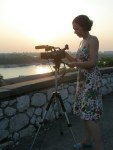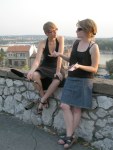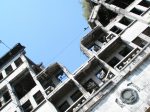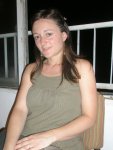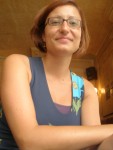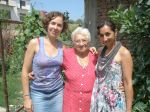From Belgrade over Vojvodina back “home”: Stories of longings, memories & real life
August 10, 2009
Our hosts Liljana and Pedja took us to a free open air concert of YU-rock legend Dado Topić on the riverbanks of Sava in Novi Beograd. Dado gave an really YU-nostalgic concert, singing his hits from the 80s, like probably the most famous one: “Makedonija”. For us, it was somehow strange: There is a Croat standing on the stage who is speaking obviously more Serbian (his wife is Serb) and singing about the beauties and the longing for Makedonia. Later he presented his new song “Against Euro-Integration, because this is only shifting the borders from around the Balkans inside the Balkans. Europe was always here, without the decision of Italians our Spains over our heads that are then ruling our live.” An attitude of “pravi rockeri”.
On Sunday we had a beautiful interview with Mirjana, a business women, former docent for economy and a friend of Aleksandras mother who pampered us as if we were her own children. She provided us drinks, pita and salad, a wonderful bosnian cake, coffee, a wonderful view on Belgrade and with wise words for the interview and for our personal future.
We headed to Postena Kafana – that is always closed on Sundays. But by coincidence, sombody passed by asking us why we were sitting in front of the Kafana. It was Misan who works here and who opened it for us to film the amazing atmosphere of the rooms that are stuffed with pictures, sculptures and other relics from SFRJ and who gave us an interview as well. In the evening we took some shots on Kalemegdan – the view on the riverside, old people dancing Kolo etc. And we were meeting my friend Iva again. On our way home we passed by a group of young musicians, playing really wonderful songs with Eastern European influence on the street. We were dancing. In the very end, we’ve found out – they are from Nürnberg. Dancing in Belgrade to East European sounding music from Nürnberg. Funny.
On Monday we took again some city shots, of the church of Sveti Sava, of a former state building hosting the police that was destroyed by NATO bombing and so on. After a delicious break in a restaurant in Skadarlija we interviewed the 90-year old Nikola, who told us of his life and of his attitude to Jugonostalgija. He fought with Tito’s Partisans, was member of the Communist Party in Montenegro and was prisoned in Goli Otok – that is sometimes called “Tito’s GULAG“ – for more than two years because of reasonless suspicions. He is still convinced of Jugoslavism and of the socialist system and he has a nostalgia towards his memories to the „good times“ – but he is very aware of the problematic misuse of power in a system that nowadays is called totalitarian.
In the evening we interviewed our host Liljana who told us about one of her teachers who was a “typical strict communist”. For Liljana, Jugonostalgia is about childhood memories and typical products like Vegeta and not that important. She is more concentrated on building a positive future. The future is always determined by the past. That is why Liljana is disappointed about the parents’ generation that didn’t take responsability for what went wrong during the Milošević regime. After the interview we went for some drinks – it was our last evening with Liljana and Pedja.
On Tuesday we bought the last souvenirs before meeting my friend Ana who managed it somehow to arrive on time in Belgrade from her holidays on a Croatian island despite a broken car. Ana is writing her Ph.D. thesis in the UK on the „Serbian identity“. She is of the opinion, that it is very difficult for the Serbs to find their own identity. In the often changing narratives of the past, there aren’t many fixed points to rely on, so that those like the battle of Kosovo polje in 1389 are used that are highly problematic themselves. For her it is important that Serbia is trying to overcome its identity that is mostly constructed by quasi-holy myths.
In the evening, after saying goodbye to our great, great hosts (thank you so much again!) we drove to Vojvodina, to the small village of Bešenovo. Here lives Josefinas mother Juliška who welcomed us warmly. She is living on a small farm together with a lot of different animals and is caring of a beautiful fruit and vegetable garden, her “jungle”. In the next days we were talking hours and eating and sleeping. We did some small trips to Sremska Mitrovica, the fortress Petrovaradin and Novi Sad, and we even worked a bit. We realised that our “nostalgic suitcase“ became really packed during our journey, and together with the two books on Tito Vladimir in Bešenovo gave us there is now almost no more space left 🙂 Especially we enjoyed Juliškas special diet for beloved guests: She ordered a huge (!!!) welcome cake for us, then she even slaughtered a goose for us, and of course we had to take with us kilos of fresh vegetables and fruits, meat, self-made cheese and liqueur, sausages and some litres of really old Slivovic that a woman from the neighbourhood was saving for her childrens’ weddings. Thank you so much for pampering your “three daughters”!
On Saturday we were driving all day long from Bešenovo to Ljubljana. We arrived at Ksenija’s place who provided us her flat (thanks to you and key-bringer Nina!). On Saturday we interviewed Boštjan Troha. He is very jugonostalgic, collecting old packs of popular products, nostalgic relics, cars etc. He founded the association “Nostalgija” that is organising concerts, gatherings and even pilgrimages with old Fico cars from Titos birthplace in Kumrovec to his grave in Belgrade. Now he plans to open a nostalgic warehouse museum in Ljubljana and to organise a big event for the 25th May 2010, the Day of Youth – 30 years after Tito’s death.
After the interview we went back to Klagenfurt. Here we are staying for two days with Georg and Kerstin (thanks so much!) to calm down, to get the last things organized and to finish our „inner journey“ as well. On Tuesday we have our last interview with Adnan, who is writing his Ph.D. thesis on Jugonostalgia in Nothern Bosnia (the region around Bihać) – and then we are departing.


